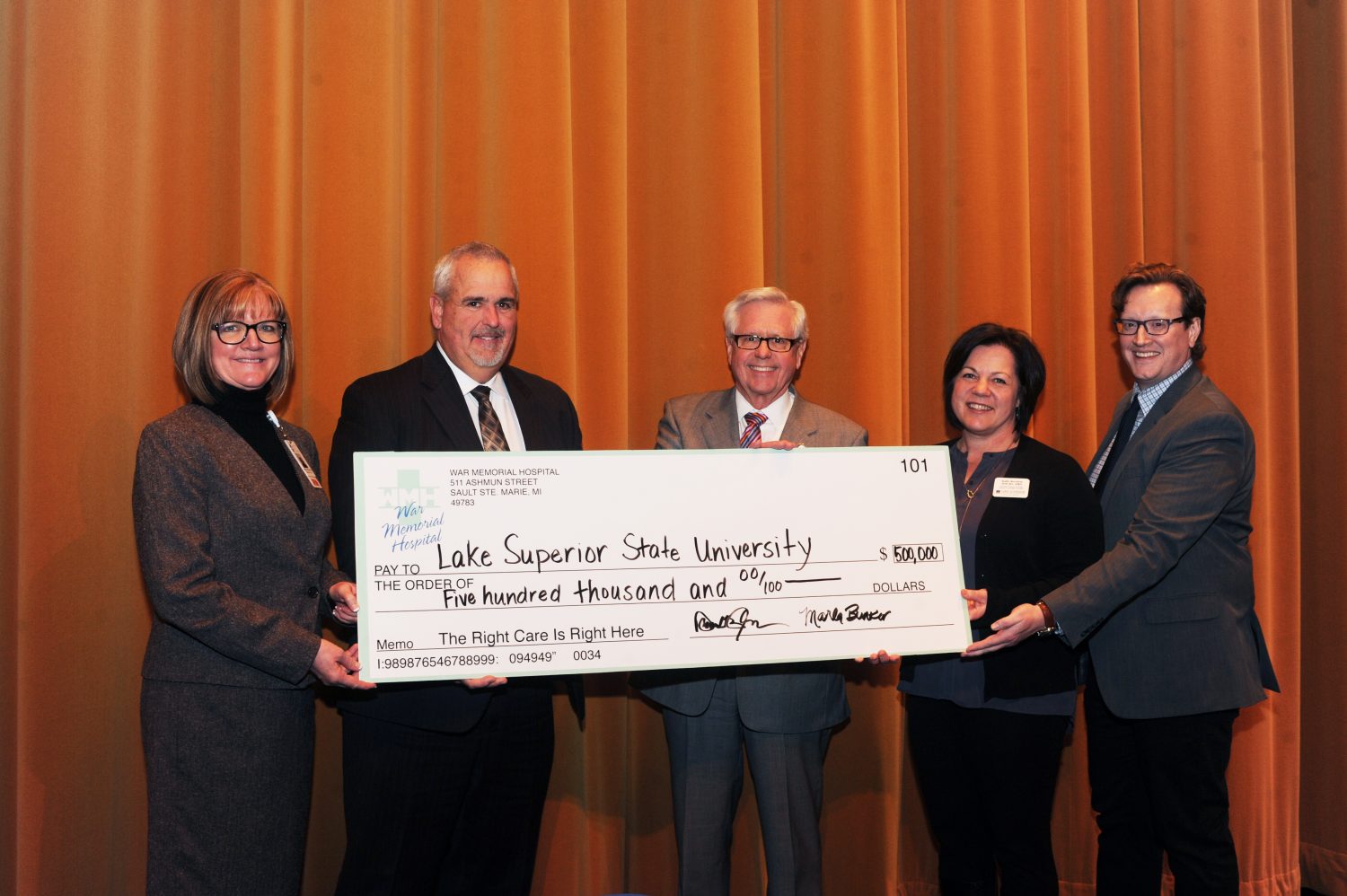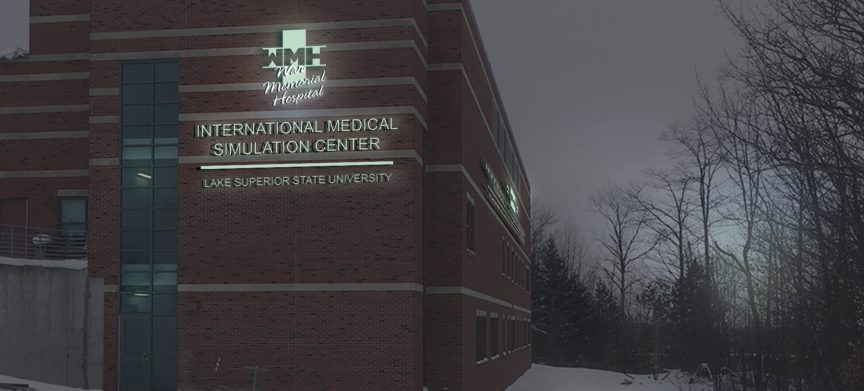A four-year dream of establishing a state-of-the-art nursing skills simulation center on Lake Superior State University’s Sault Ste. Marie, Mich. campus is now realized. An agreement signed March 7 with War Memorial Hospital transforms LSSU’s existing Superior Simulation Center into a regional center that will train and reach more healthcare professionals not only in the international Great Lakes region, but throughout North America as well.
“Solving problems today requires collaboration and shared vision. The relationship between War Memorial Hospital and Lake Superior State University has been symbiotic for many years. The Simulation Center takes the mutual support between our organizations to a new level. The result of joining forces will establish a truly international facility serving nursing and other healthcare needs in the Eastern Upper Peninsula and Ontario,” said President Peter T. Mitchell. “Housing the Sim Center in the Arts Center provides a unique venue for offering conferences and symposia for up to 700 people during the summer, creating additional economic development and expanded tourism for the Soo on both sides of the St. Marys River.”
The new facility will be called the Lake Superior State University-War Memorial Hospital International Medical Simulation Center. Its footprint will fit into existing space on the lower level of LSSU’s Arts Center. A half-million dollar gift from WMH underwrites relocating Simulation Center equipment from its present location in Sault Ste. Marie’s Smart Zone building, and any needed infrastructure upgrades to the Arts Center.
We have been working with LSSU for many years to jointly develop a simulation center. This has taken many shapes, forms and locations, but I am extremely happy that we finally have a location and an agreement to move this partnership forward. LSSU’s Nursing Program is vital to the future recruitment of high quality registered nurses to WMH and this partnership will help expand the number of nursing students in the program each year.
“The agreement also provides more centralized education for our current healthcare professionals and it allows us to do simulations of high acuity situations using the Simulation Center and the ‘manikins’ which provide additional opportunities to improve our processes to ensure success in these highly stressful situations. I would like to thank LSSU President Peter Mitchell for all of his hard work and willingness to broker an agreement to benefit both organizations,” commented Jahn.
LSSU’s Superior Simulation Center was established in 2014 through an anchor gift from the R. W. Considine Foundation, and was one of the first tenants in Sault Ste. Marie’s Smart Zone building. During its formative years, the center provided innovative instructional programs and served as a learning laboratory that provided challenging, immersive simulation training for nurses, paramedics, and other health care professionals at LSSU and from the eastern Upper Peninsula and northern Lower Michigan.
At the Simulation Center’s core are wireless mannequins used for training LSSU students and medical professionals about various healthcare procedures. They include an infant and adult male mannequin, as well as an expectant mother that can deliver a baby. The mannequins blink, bleed, cry, sweat and express their symptoms to healthcare workers and students just as live patients might, and respond to treatment much like live patients would.
“These life-like patients simulate heart tones and other vital cues that when connected to monitors, provides real-time information to learners,” said Superior Simulation Center Director Kathy Berchem. “By practicing true clinical skills in a safe and regulated environment, future and current healthcare providers gain competence and confidence in their clinical patient care skills.”
“Through this partnership with WMH the Superior Simulation Center will be the regional resource for addressing health outcomes by providing an immersive learning laboratory environment using clinical simulation,” Berchem added.
The educational learning at the Sim Center will also serve as continuing education to the nursing staff at War Memorial Hospital. “I am so thrilled that our collaborative relationship with LSSU will be expanding to encompass WMH education into a designated education space that can be integrated with simulation experiences,” said Vice President of Nursing and Operations Marla Bunker. “Not only will LSSU nursing students be on the WMH campus for their clinical experience, now WMH staff will be on the LSSU campus for ongoing professional continuing education and certifications.”
 The expanded collaboration with WMH will lead LSSU to develop new healthcare programs of study. It will also let the two institutions tap one another’s attributes to sponsor larger conferences that draw medical professionals from Canada, the U.S.A. and beyond, generating new revenue streams for both LSSU and WMH. The simulation center’s enhanced capacity for teaching – along with the inevitable growth of partnerships with War Memorial – holds promise to increase enrollment in the LSSU Nursing program by more than 30%.
The expanded collaboration with WMH will lead LSSU to develop new healthcare programs of study. It will also let the two institutions tap one another’s attributes to sponsor larger conferences that draw medical professionals from Canada, the U.S.A. and beyond, generating new revenue streams for both LSSU and WMH. The simulation center’s enhanced capacity for teaching – along with the inevitable growth of partnerships with War Memorial – holds promise to increase enrollment in the LSSU Nursing program by more than 30%.
The Simulation Center’s move to the first floor of the facility will not diminish the Art Center’s forte for presenting exciting, live musical performances, plays, speakers, films, and community events on the main level. “The Simulation Center presents an opportunity to focus on arts programming, as well,” said Theatre Professor and Arts Center Director, Spencer D. Christensen. “There is a natural synergy between the healthcare community and the fine and performing arts because both disciplines look after the mind, body, and spirit; reminding us all of what it is to be human.” Classes will continue to tap the Art Center’s unique resources, space for theatrical production will not see a substantial impact, and the Arts Center will offer visiting and in-house exhibits in its main-floor gallery.
As it is, the arts and applied sciences have mingled for years. An exciting and growing collaboration with Lake State theatre and nursing students has already been underway. LSSU drama students regularly volunteer as ‘patients’ for School of Nursing clinical and laboratory exercises. Introducing the human element to the room is clearly important and allows students on both sides of the scenario to practice effective and appropriate communication. The actors love working in an improvisational manner and enjoy helping fellow students. “Theatre and other performing arts are vital to a university experience and offer invaluable opportunities for students in a variety of disciplines to gain vital collaboration and problem solving skills, as well as increase students’ communicative confidence,” added Christensen.
About the Author
 Kellie Greener
Kellie GreenerDirector of Marketing & Communications
Kellie graduated from LSSU in 2010 with a B.S. in Business Administration - Marketing. She joined as the marketing director in April 2017 after spending six years in London, England. Kellie served as interim director of admissions between August 2017 and January 2018. She has recently resumed her role in the marketing and communications department. In her spare time, Kellie enjoys chasing after her three children, stand up paddleboarding and wakeboarding in the summer, and reading.
